Managing Across Borders: Outsourcing Strategies in Global Business
VerifiedAdded on 2022/09/18
|9
|1855
|24
Essay
AI Summary
This essay provides a comprehensive analysis of managing across borders through outsourcing, tracing its historical roots to the Industrial Revolution and its evolution into a strategic tool for businesses in a globalized world. It delves into the advantages of outsourcing, such as cost savings, reduced staffing fluctuations, and risk mitigation, while also addressing potential disadvantages like social environment impacts, partner selection risks, and exposure of confidential information. The essay further examines outsourcing's role in a globalized context, highlighting its increasing importance across various industries, particularly in supply chain logistics. A case study illustrates the potential for outsourcing failure due to inadequate management and relationship planning. The conclusion emphasizes the need for strategic business strategies to leverage the benefits of outsourcing while mitigating its limitations. Desklib offers a wealth of similar academic resources for students.
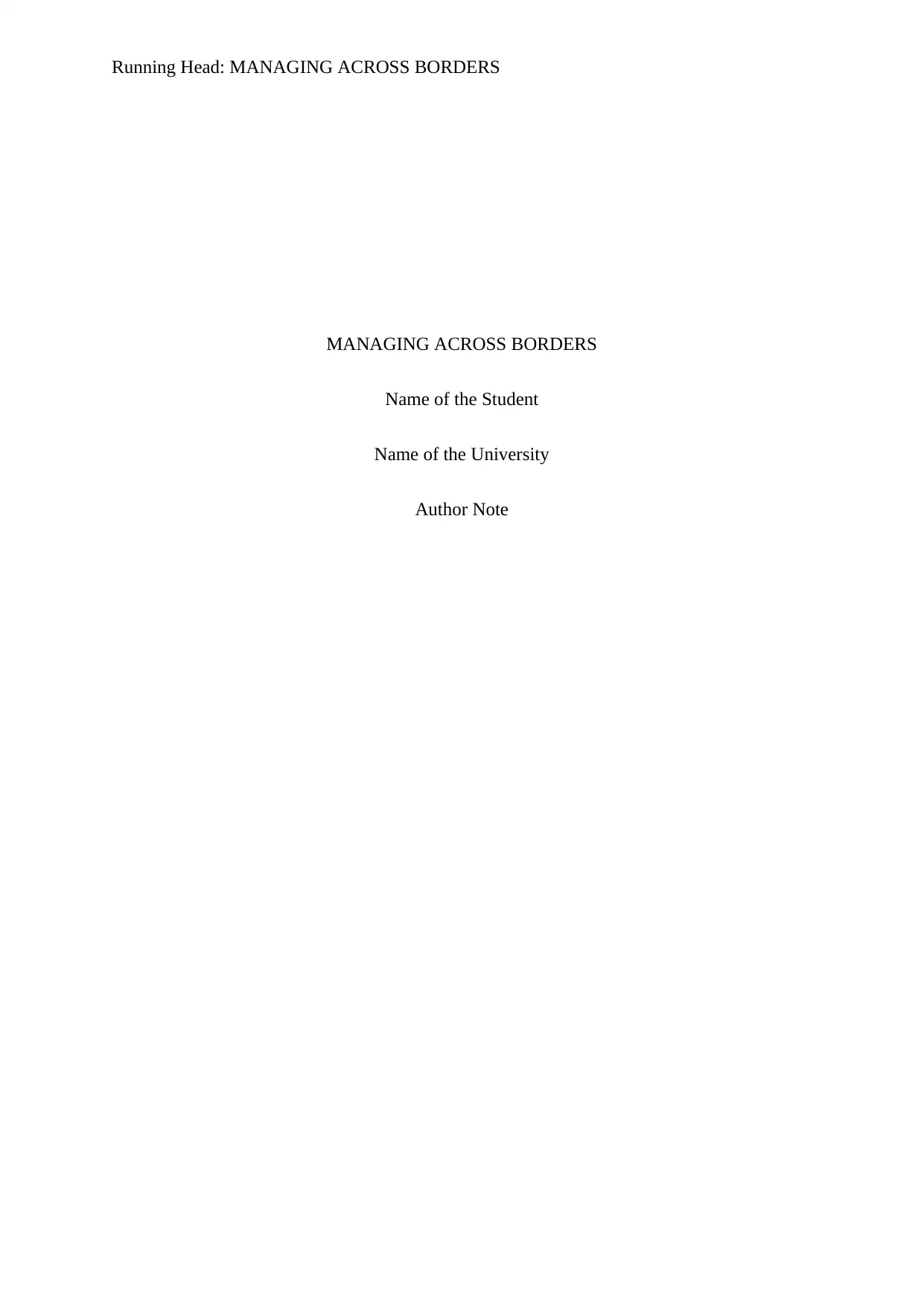
Running Head: MANAGING ACROSS BORDERS
MANAGING ACROSS BORDERS
Name of the Student
Name of the University
Author Note
MANAGING ACROSS BORDERS
Name of the Student
Name of the University
Author Note
Paraphrase This Document
Need a fresh take? Get an instant paraphrase of this document with our AI Paraphraser
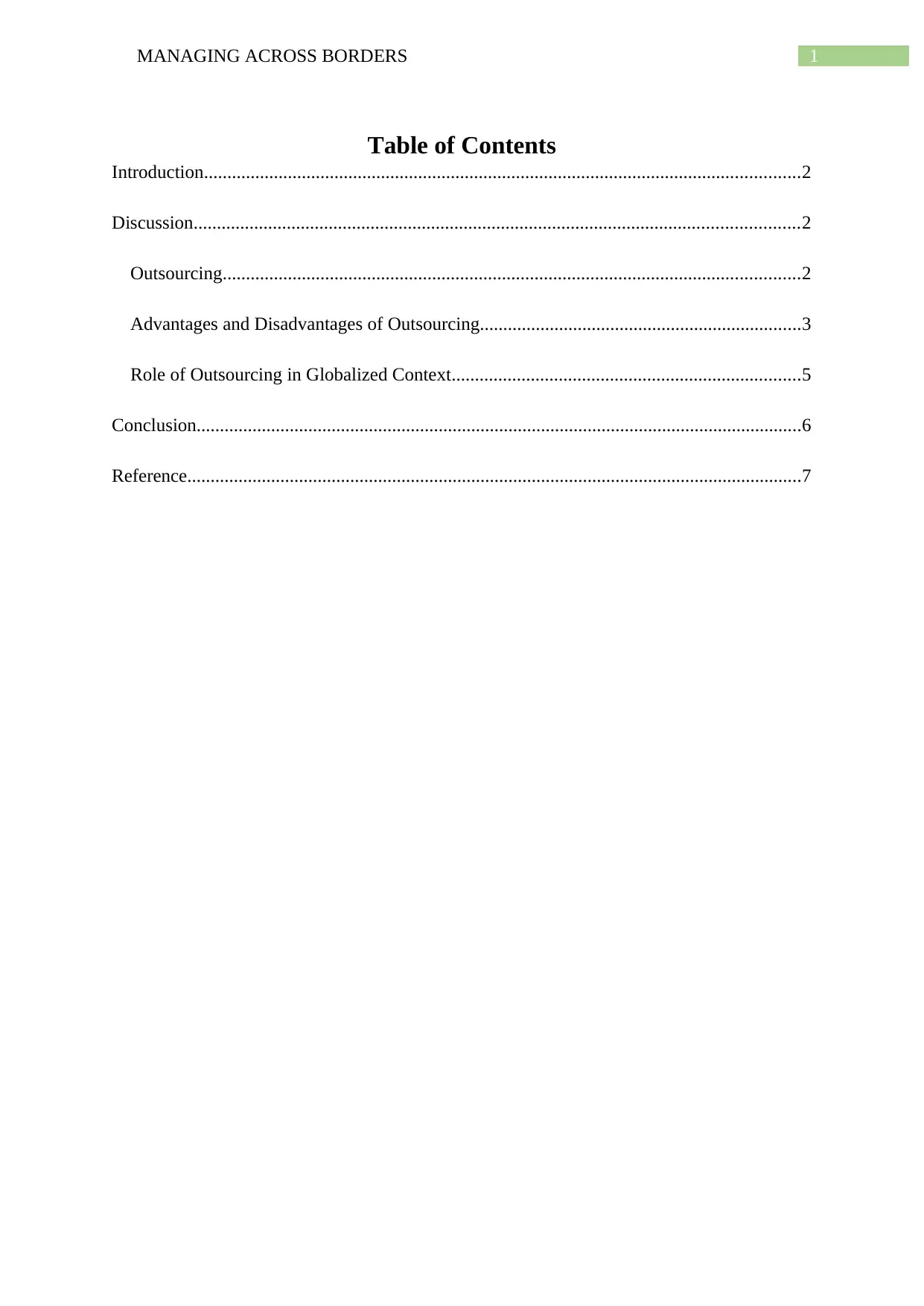
1MANAGING ACROSS BORDERS
Table of Contents
Introduction................................................................................................................................2
Discussion..................................................................................................................................2
Outsourcing............................................................................................................................2
Advantages and Disadvantages of Outsourcing.....................................................................3
Role of Outsourcing in Globalized Context...........................................................................5
Conclusion..................................................................................................................................6
Reference....................................................................................................................................7
Table of Contents
Introduction................................................................................................................................2
Discussion..................................................................................................................................2
Outsourcing............................................................................................................................2
Advantages and Disadvantages of Outsourcing.....................................................................3
Role of Outsourcing in Globalized Context...........................................................................5
Conclusion..................................................................................................................................6
Reference....................................................................................................................................7
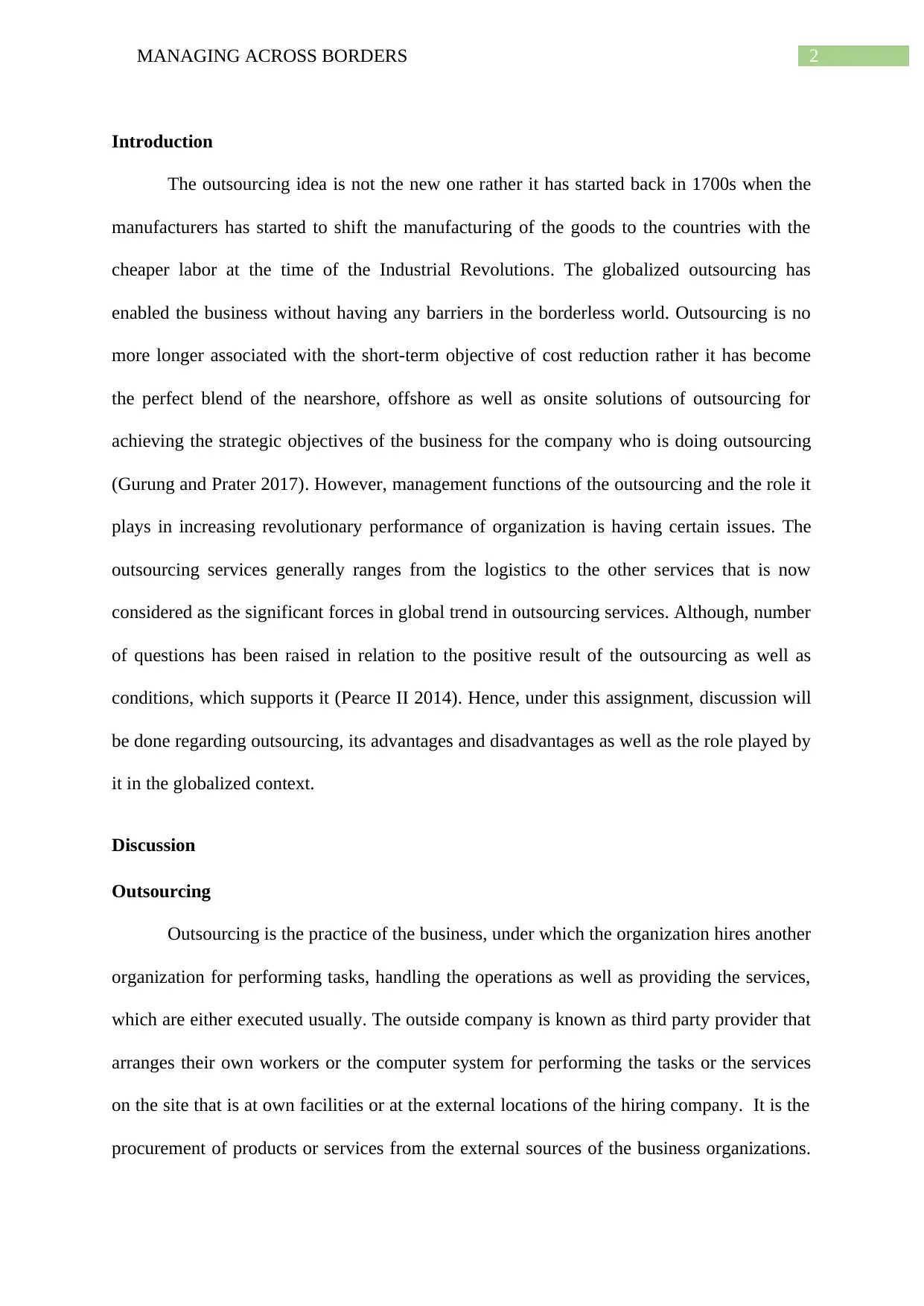
2MANAGING ACROSS BORDERS
Introduction
The outsourcing idea is not the new one rather it has started back in 1700s when the
manufacturers has started to shift the manufacturing of the goods to the countries with the
cheaper labor at the time of the Industrial Revolutions. The globalized outsourcing has
enabled the business without having any barriers in the borderless world. Outsourcing is no
more longer associated with the short-term objective of cost reduction rather it has become
the perfect blend of the nearshore, offshore as well as onsite solutions of outsourcing for
achieving the strategic objectives of the business for the company who is doing outsourcing
(Gurung and Prater 2017). However, management functions of the outsourcing and the role it
plays in increasing revolutionary performance of organization is having certain issues. The
outsourcing services generally ranges from the logistics to the other services that is now
considered as the significant forces in global trend in outsourcing services. Although, number
of questions has been raised in relation to the positive result of the outsourcing as well as
conditions, which supports it (Pearce II 2014). Hence, under this assignment, discussion will
be done regarding outsourcing, its advantages and disadvantages as well as the role played by
it in the globalized context.
Discussion
Outsourcing
Outsourcing is the practice of the business, under which the organization hires another
organization for performing tasks, handling the operations as well as providing the services,
which are either executed usually. The outside company is known as third party provider that
arranges their own workers or the computer system for performing the tasks or the services
on the site that is at own facilities or at the external locations of the hiring company. It is the
procurement of products or services from the external sources of the business organizations.
Introduction
The outsourcing idea is not the new one rather it has started back in 1700s when the
manufacturers has started to shift the manufacturing of the goods to the countries with the
cheaper labor at the time of the Industrial Revolutions. The globalized outsourcing has
enabled the business without having any barriers in the borderless world. Outsourcing is no
more longer associated with the short-term objective of cost reduction rather it has become
the perfect blend of the nearshore, offshore as well as onsite solutions of outsourcing for
achieving the strategic objectives of the business for the company who is doing outsourcing
(Gurung and Prater 2017). However, management functions of the outsourcing and the role it
plays in increasing revolutionary performance of organization is having certain issues. The
outsourcing services generally ranges from the logistics to the other services that is now
considered as the significant forces in global trend in outsourcing services. Although, number
of questions has been raised in relation to the positive result of the outsourcing as well as
conditions, which supports it (Pearce II 2014). Hence, under this assignment, discussion will
be done regarding outsourcing, its advantages and disadvantages as well as the role played by
it in the globalized context.
Discussion
Outsourcing
Outsourcing is the practice of the business, under which the organization hires another
organization for performing tasks, handling the operations as well as providing the services,
which are either executed usually. The outside company is known as third party provider that
arranges their own workers or the computer system for performing the tasks or the services
on the site that is at own facilities or at the external locations of the hiring company. It is the
procurement of products or services from the external sources of the business organizations.
⊘ This is a preview!⊘
Do you want full access?
Subscribe today to unlock all pages.

Trusted by 1+ million students worldwide
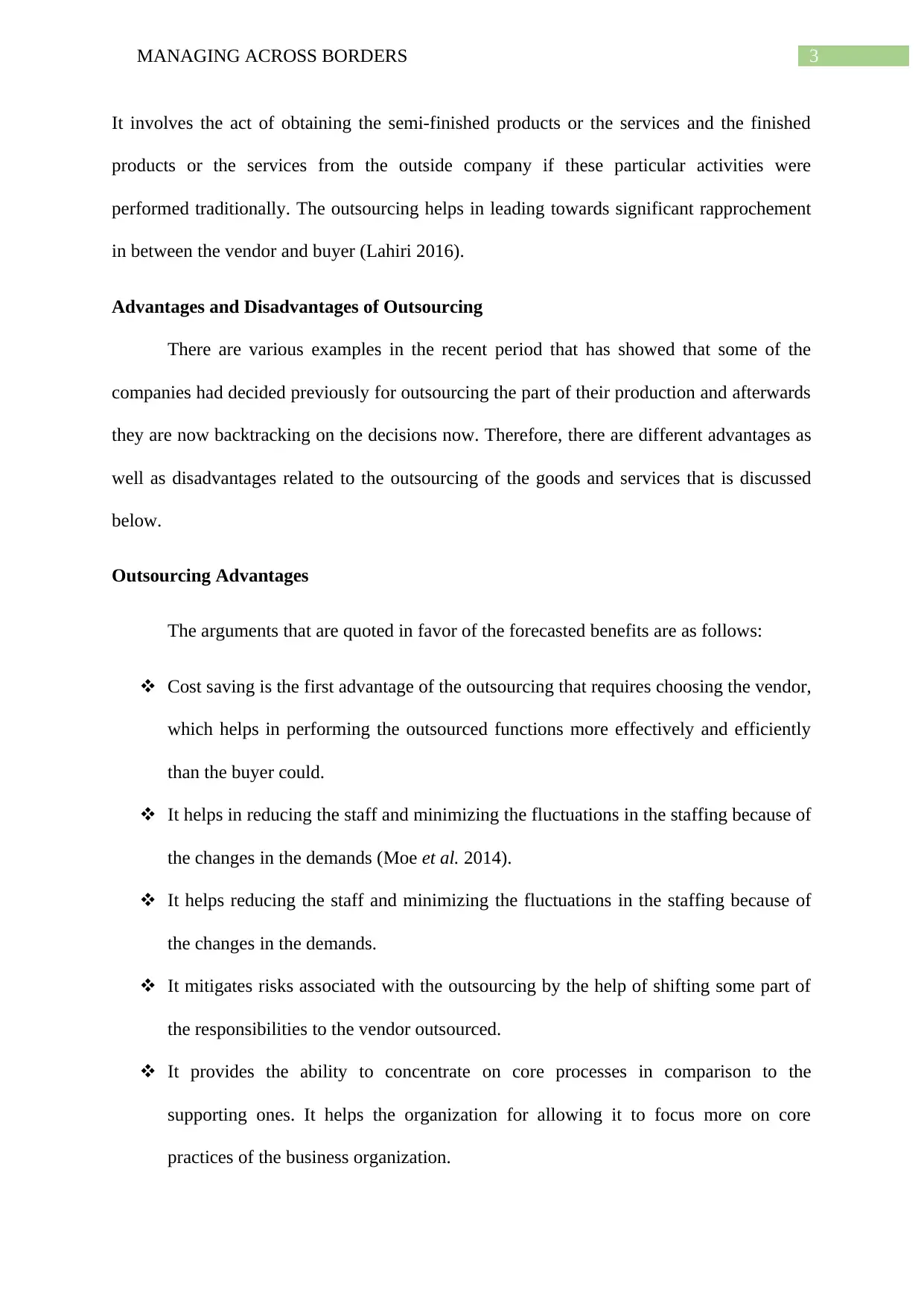
3MANAGING ACROSS BORDERS
It involves the act of obtaining the semi-finished products or the services and the finished
products or the services from the outside company if these particular activities were
performed traditionally. The outsourcing helps in leading towards significant rapprochement
in between the vendor and buyer (Lahiri 2016).
Advantages and Disadvantages of Outsourcing
There are various examples in the recent period that has showed that some of the
companies had decided previously for outsourcing the part of their production and afterwards
they are now backtracking on the decisions now. Therefore, there are different advantages as
well as disadvantages related to the outsourcing of the goods and services that is discussed
below.
Outsourcing Advantages
The arguments that are quoted in favor of the forecasted benefits are as follows:
Cost saving is the first advantage of the outsourcing that requires choosing the vendor,
which helps in performing the outsourced functions more effectively and efficiently
than the buyer could.
It helps in reducing the staff and minimizing the fluctuations in the staffing because of
the changes in the demands (Moe et al. 2014).
It helps reducing the staff and minimizing the fluctuations in the staffing because of
the changes in the demands.
It mitigates risks associated with the outsourcing by the help of shifting some part of
the responsibilities to the vendor outsourced.
It provides the ability to concentrate on core processes in comparison to the
supporting ones. It helps the organization for allowing it to focus more on core
practices of the business organization.
It involves the act of obtaining the semi-finished products or the services and the finished
products or the services from the outside company if these particular activities were
performed traditionally. The outsourcing helps in leading towards significant rapprochement
in between the vendor and buyer (Lahiri 2016).
Advantages and Disadvantages of Outsourcing
There are various examples in the recent period that has showed that some of the
companies had decided previously for outsourcing the part of their production and afterwards
they are now backtracking on the decisions now. Therefore, there are different advantages as
well as disadvantages related to the outsourcing of the goods and services that is discussed
below.
Outsourcing Advantages
The arguments that are quoted in favor of the forecasted benefits are as follows:
Cost saving is the first advantage of the outsourcing that requires choosing the vendor,
which helps in performing the outsourced functions more effectively and efficiently
than the buyer could.
It helps in reducing the staff and minimizing the fluctuations in the staffing because of
the changes in the demands (Moe et al. 2014).
It helps reducing the staff and minimizing the fluctuations in the staffing because of
the changes in the demands.
It mitigates risks associated with the outsourcing by the help of shifting some part of
the responsibilities to the vendor outsourced.
It provides the ability to concentrate on core processes in comparison to the
supporting ones. It helps the organization for allowing it to focus more on core
practices of the business organization.
Paraphrase This Document
Need a fresh take? Get an instant paraphrase of this document with our AI Paraphraser
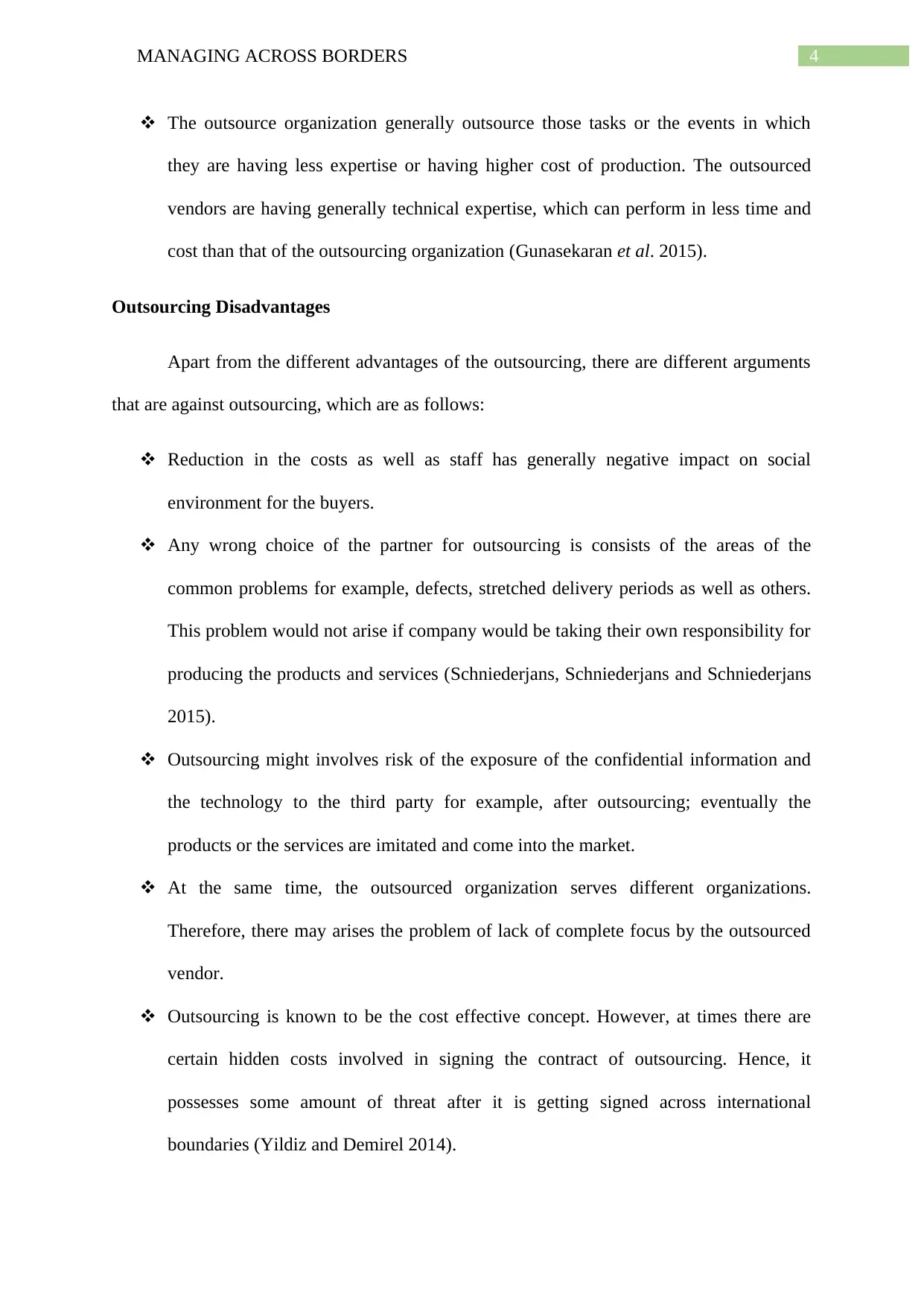
4MANAGING ACROSS BORDERS
The outsource organization generally outsource those tasks or the events in which
they are having less expertise or having higher cost of production. The outsourced
vendors are having generally technical expertise, which can perform in less time and
cost than that of the outsourcing organization (Gunasekaran et al. 2015).
Outsourcing Disadvantages
Apart from the different advantages of the outsourcing, there are different arguments
that are against outsourcing, which are as follows:
Reduction in the costs as well as staff has generally negative impact on social
environment for the buyers.
Any wrong choice of the partner for outsourcing is consists of the areas of the
common problems for example, defects, stretched delivery periods as well as others.
This problem would not arise if company would be taking their own responsibility for
producing the products and services (Schniederjans, Schniederjans and Schniederjans
2015).
Outsourcing might involves risk of the exposure of the confidential information and
the technology to the third party for example, after outsourcing; eventually the
products or the services are imitated and come into the market.
At the same time, the outsourced organization serves different organizations.
Therefore, there may arises the problem of lack of complete focus by the outsourced
vendor.
Outsourcing is known to be the cost effective concept. However, at times there are
certain hidden costs involved in signing the contract of outsourcing. Hence, it
possesses some amount of threat after it is getting signed across international
boundaries (Yildiz and Demirel 2014).
The outsource organization generally outsource those tasks or the events in which
they are having less expertise or having higher cost of production. The outsourced
vendors are having generally technical expertise, which can perform in less time and
cost than that of the outsourcing organization (Gunasekaran et al. 2015).
Outsourcing Disadvantages
Apart from the different advantages of the outsourcing, there are different arguments
that are against outsourcing, which are as follows:
Reduction in the costs as well as staff has generally negative impact on social
environment for the buyers.
Any wrong choice of the partner for outsourcing is consists of the areas of the
common problems for example, defects, stretched delivery periods as well as others.
This problem would not arise if company would be taking their own responsibility for
producing the products and services (Schniederjans, Schniederjans and Schniederjans
2015).
Outsourcing might involves risk of the exposure of the confidential information and
the technology to the third party for example, after outsourcing; eventually the
products or the services are imitated and come into the market.
At the same time, the outsourced organization serves different organizations.
Therefore, there may arises the problem of lack of complete focus by the outsourced
vendor.
Outsourcing is known to be the cost effective concept. However, at times there are
certain hidden costs involved in signing the contract of outsourcing. Hence, it
possesses some amount of threat after it is getting signed across international
boundaries (Yildiz and Demirel 2014).
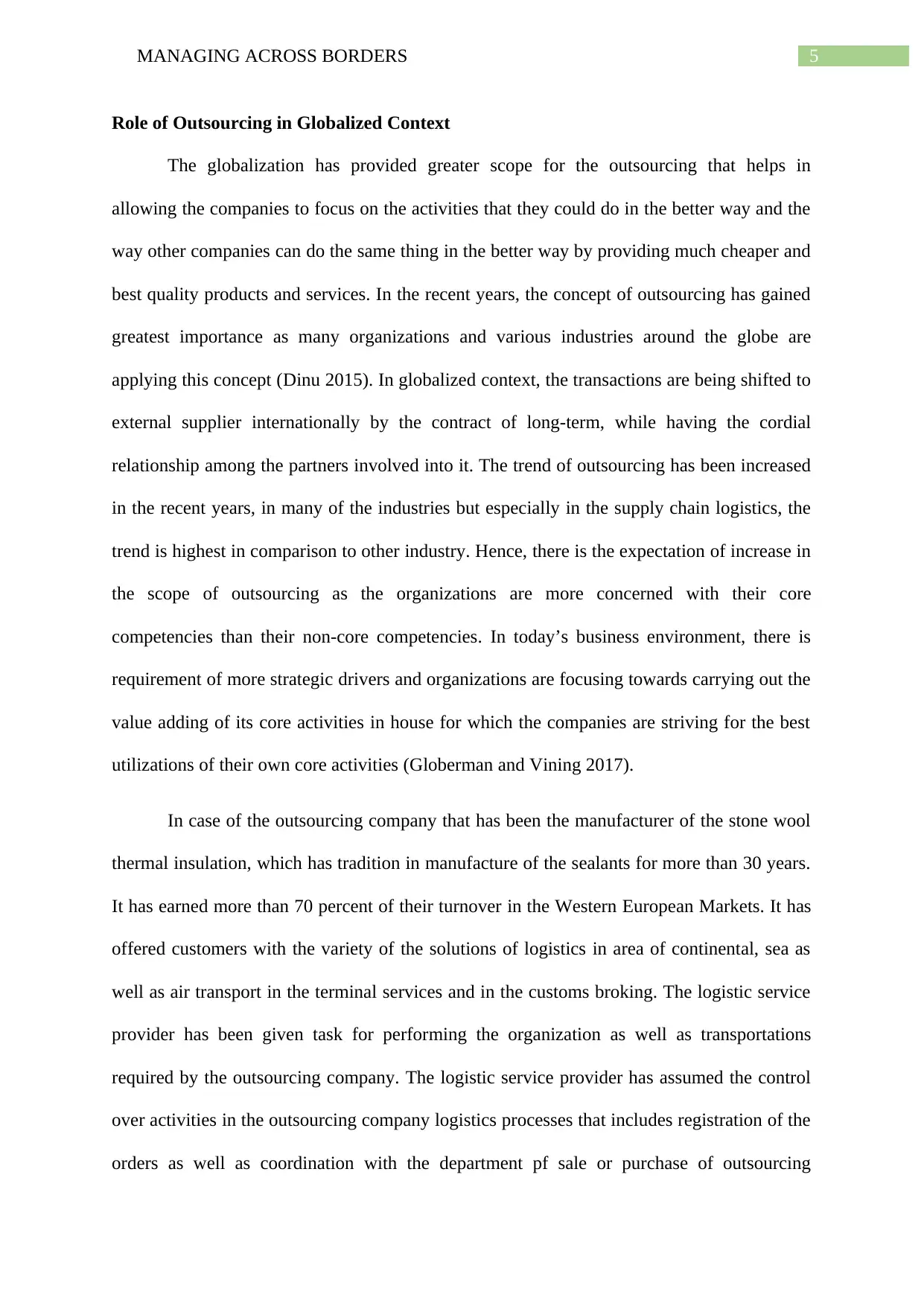
5MANAGING ACROSS BORDERS
Role of Outsourcing in Globalized Context
The globalization has provided greater scope for the outsourcing that helps in
allowing the companies to focus on the activities that they could do in the better way and the
way other companies can do the same thing in the better way by providing much cheaper and
best quality products and services. In the recent years, the concept of outsourcing has gained
greatest importance as many organizations and various industries around the globe are
applying this concept (Dinu 2015). In globalized context, the transactions are being shifted to
external supplier internationally by the contract of long-term, while having the cordial
relationship among the partners involved into it. The trend of outsourcing has been increased
in the recent years, in many of the industries but especially in the supply chain logistics, the
trend is highest in comparison to other industry. Hence, there is the expectation of increase in
the scope of outsourcing as the organizations are more concerned with their core
competencies than their non-core competencies. In today’s business environment, there is
requirement of more strategic drivers and organizations are focusing towards carrying out the
value adding of its core activities in house for which the companies are striving for the best
utilizations of their own core activities (Globerman and Vining 2017).
In case of the outsourcing company that has been the manufacturer of the stone wool
thermal insulation, which has tradition in manufacture of the sealants for more than 30 years.
It has earned more than 70 percent of their turnover in the Western European Markets. It has
offered customers with the variety of the solutions of logistics in area of continental, sea as
well as air transport in the terminal services and in the customs broking. The logistic service
provider has been given task for performing the organization as well as transportations
required by the outsourcing company. The logistic service provider has assumed the control
over activities in the outsourcing company logistics processes that includes registration of the
orders as well as coordination with the department pf sale or purchase of outsourcing
Role of Outsourcing in Globalized Context
The globalization has provided greater scope for the outsourcing that helps in
allowing the companies to focus on the activities that they could do in the better way and the
way other companies can do the same thing in the better way by providing much cheaper and
best quality products and services. In the recent years, the concept of outsourcing has gained
greatest importance as many organizations and various industries around the globe are
applying this concept (Dinu 2015). In globalized context, the transactions are being shifted to
external supplier internationally by the contract of long-term, while having the cordial
relationship among the partners involved into it. The trend of outsourcing has been increased
in the recent years, in many of the industries but especially in the supply chain logistics, the
trend is highest in comparison to other industry. Hence, there is the expectation of increase in
the scope of outsourcing as the organizations are more concerned with their core
competencies than their non-core competencies. In today’s business environment, there is
requirement of more strategic drivers and organizations are focusing towards carrying out the
value adding of its core activities in house for which the companies are striving for the best
utilizations of their own core activities (Globerman and Vining 2017).
In case of the outsourcing company that has been the manufacturer of the stone wool
thermal insulation, which has tradition in manufacture of the sealants for more than 30 years.
It has earned more than 70 percent of their turnover in the Western European Markets. It has
offered customers with the variety of the solutions of logistics in area of continental, sea as
well as air transport in the terminal services and in the customs broking. The logistic service
provider has been given task for performing the organization as well as transportations
required by the outsourcing company. The logistic service provider has assumed the control
over activities in the outsourcing company logistics processes that includes registration of the
orders as well as coordination with the department pf sale or purchase of outsourcing
⊘ This is a preview!⊘
Do you want full access?
Subscribe today to unlock all pages.

Trusted by 1+ million students worldwide
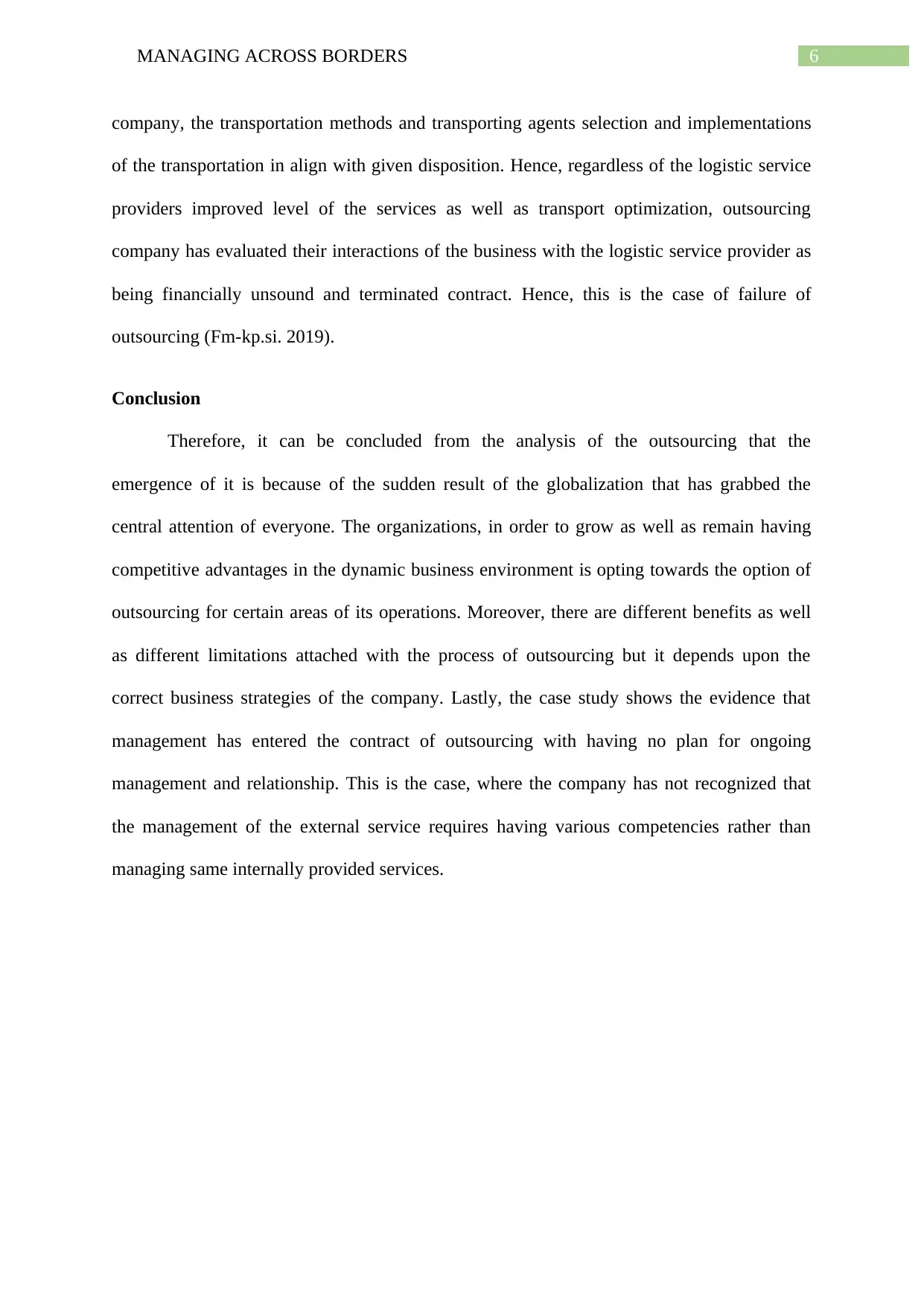
6MANAGING ACROSS BORDERS
company, the transportation methods and transporting agents selection and implementations
of the transportation in align with given disposition. Hence, regardless of the logistic service
providers improved level of the services as well as transport optimization, outsourcing
company has evaluated their interactions of the business with the logistic service provider as
being financially unsound and terminated contract. Hence, this is the case of failure of
outsourcing (Fm-kp.si. 2019).
Conclusion
Therefore, it can be concluded from the analysis of the outsourcing that the
emergence of it is because of the sudden result of the globalization that has grabbed the
central attention of everyone. The organizations, in order to grow as well as remain having
competitive advantages in the dynamic business environment is opting towards the option of
outsourcing for certain areas of its operations. Moreover, there are different benefits as well
as different limitations attached with the process of outsourcing but it depends upon the
correct business strategies of the company. Lastly, the case study shows the evidence that
management has entered the contract of outsourcing with having no plan for ongoing
management and relationship. This is the case, where the company has not recognized that
the management of the external service requires having various competencies rather than
managing same internally provided services.
company, the transportation methods and transporting agents selection and implementations
of the transportation in align with given disposition. Hence, regardless of the logistic service
providers improved level of the services as well as transport optimization, outsourcing
company has evaluated their interactions of the business with the logistic service provider as
being financially unsound and terminated contract. Hence, this is the case of failure of
outsourcing (Fm-kp.si. 2019).
Conclusion
Therefore, it can be concluded from the analysis of the outsourcing that the
emergence of it is because of the sudden result of the globalization that has grabbed the
central attention of everyone. The organizations, in order to grow as well as remain having
competitive advantages in the dynamic business environment is opting towards the option of
outsourcing for certain areas of its operations. Moreover, there are different benefits as well
as different limitations attached with the process of outsourcing but it depends upon the
correct business strategies of the company. Lastly, the case study shows the evidence that
management has entered the contract of outsourcing with having no plan for ongoing
management and relationship. This is the case, where the company has not recognized that
the management of the external service requires having various competencies rather than
managing same internally provided services.
Paraphrase This Document
Need a fresh take? Get an instant paraphrase of this document with our AI Paraphraser
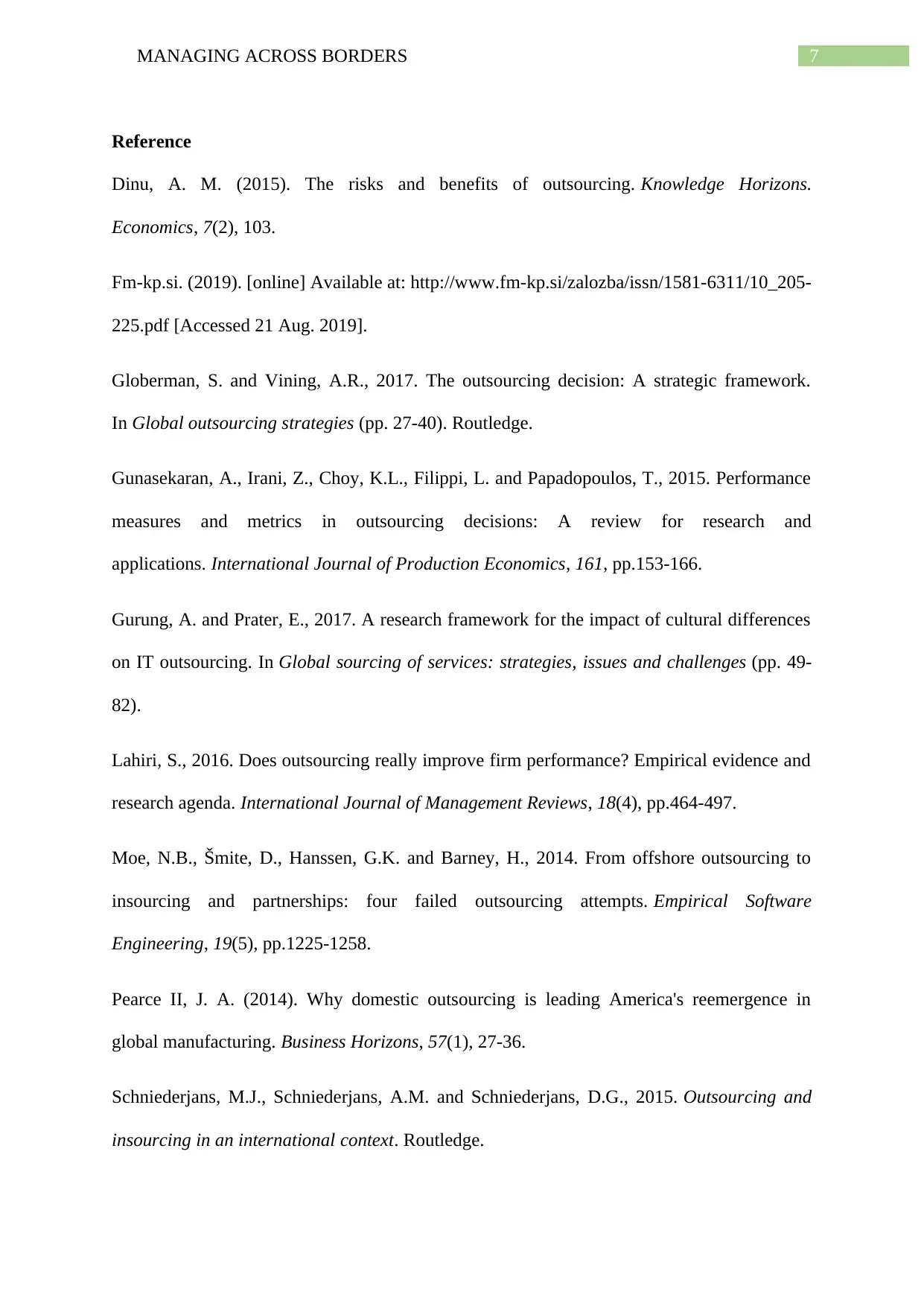
7MANAGING ACROSS BORDERS
Reference
Dinu, A. M. (2015). The risks and benefits of outsourcing. Knowledge Horizons.
Economics, 7(2), 103.
Fm-kp.si. (2019). [online] Available at: http://www.fm-kp.si/zalozba/issn/1581-6311/10_205-
225.pdf [Accessed 21 Aug. 2019].
Globerman, S. and Vining, A.R., 2017. The outsourcing decision: A strategic framework.
In Global outsourcing strategies (pp. 27-40). Routledge.
Gunasekaran, A., Irani, Z., Choy, K.L., Filippi, L. and Papadopoulos, T., 2015. Performance
measures and metrics in outsourcing decisions: A review for research and
applications. International Journal of Production Economics, 161, pp.153-166.
Gurung, A. and Prater, E., 2017. A research framework for the impact of cultural differences
on IT outsourcing. In Global sourcing of services: strategies, issues and challenges (pp. 49-
82).
Lahiri, S., 2016. Does outsourcing really improve firm performance? Empirical evidence and
research agenda. International Journal of Management Reviews, 18(4), pp.464-497.
Moe, N.B., Šmite, D., Hanssen, G.K. and Barney, H., 2014. From offshore outsourcing to
insourcing and partnerships: four failed outsourcing attempts. Empirical Software
Engineering, 19(5), pp.1225-1258.
Pearce II, J. A. (2014). Why domestic outsourcing is leading America's reemergence in
global manufacturing. Business Horizons, 57(1), 27-36.
Schniederjans, M.J., Schniederjans, A.M. and Schniederjans, D.G., 2015. Outsourcing and
insourcing in an international context. Routledge.
Reference
Dinu, A. M. (2015). The risks and benefits of outsourcing. Knowledge Horizons.
Economics, 7(2), 103.
Fm-kp.si. (2019). [online] Available at: http://www.fm-kp.si/zalozba/issn/1581-6311/10_205-
225.pdf [Accessed 21 Aug. 2019].
Globerman, S. and Vining, A.R., 2017. The outsourcing decision: A strategic framework.
In Global outsourcing strategies (pp. 27-40). Routledge.
Gunasekaran, A., Irani, Z., Choy, K.L., Filippi, L. and Papadopoulos, T., 2015. Performance
measures and metrics in outsourcing decisions: A review for research and
applications. International Journal of Production Economics, 161, pp.153-166.
Gurung, A. and Prater, E., 2017. A research framework for the impact of cultural differences
on IT outsourcing. In Global sourcing of services: strategies, issues and challenges (pp. 49-
82).
Lahiri, S., 2016. Does outsourcing really improve firm performance? Empirical evidence and
research agenda. International Journal of Management Reviews, 18(4), pp.464-497.
Moe, N.B., Šmite, D., Hanssen, G.K. and Barney, H., 2014. From offshore outsourcing to
insourcing and partnerships: four failed outsourcing attempts. Empirical Software
Engineering, 19(5), pp.1225-1258.
Pearce II, J. A. (2014). Why domestic outsourcing is leading America's reemergence in
global manufacturing. Business Horizons, 57(1), 27-36.
Schniederjans, M.J., Schniederjans, A.M. and Schniederjans, D.G., 2015. Outsourcing and
insourcing in an international context. Routledge.
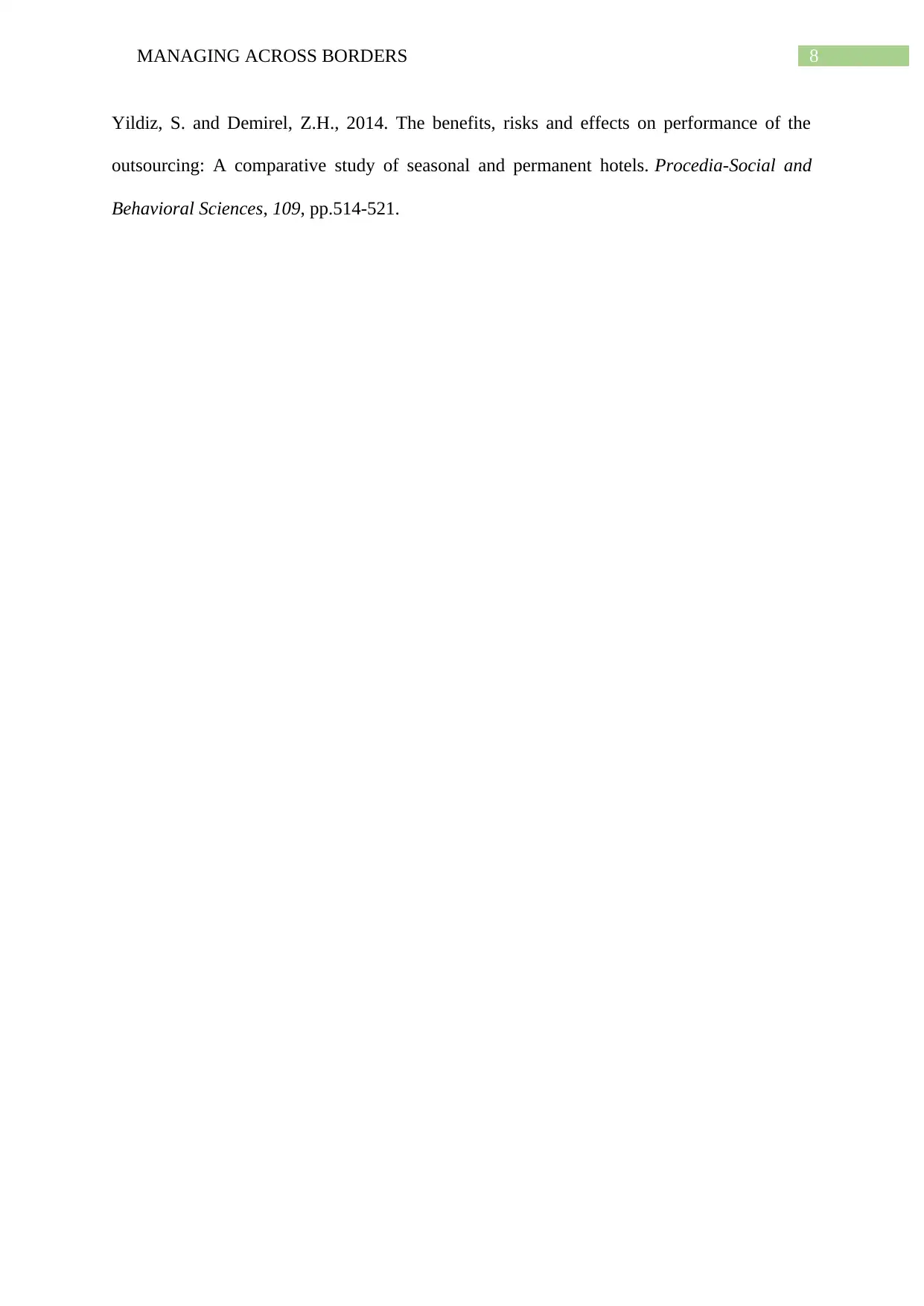
8MANAGING ACROSS BORDERS
Yildiz, S. and Demirel, Z.H., 2014. The benefits, risks and effects on performance of the
outsourcing: A comparative study of seasonal and permanent hotels. Procedia-Social and
Behavioral Sciences, 109, pp.514-521.
Yildiz, S. and Demirel, Z.H., 2014. The benefits, risks and effects on performance of the
outsourcing: A comparative study of seasonal and permanent hotels. Procedia-Social and
Behavioral Sciences, 109, pp.514-521.
⊘ This is a preview!⊘
Do you want full access?
Subscribe today to unlock all pages.

Trusted by 1+ million students worldwide
1 out of 9
Related Documents
Your All-in-One AI-Powered Toolkit for Academic Success.
+13062052269
info@desklib.com
Available 24*7 on WhatsApp / Email
![[object Object]](/_next/static/media/star-bottom.7253800d.svg)
Unlock your academic potential
Copyright © 2020–2026 A2Z Services. All Rights Reserved. Developed and managed by ZUCOL.





